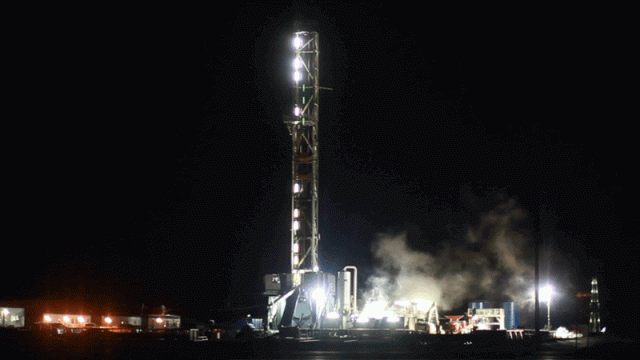Debunked: Oil Company Is Not Giving Bigger Bonuses For Speed Versus Safety

Yesterday I wrote about a story produced by the Center for Investigative Journalism, and picked up by media outlets like Politico and Reveal, which was built on a faulty premise. The story argues that, during North Dakota’s oil boom, the safety of oilfield workers was sacrificed. Yet, as I noted yesterday, that’s not really true. In the context of increased oil activity, the number of fatalities per well has actually decreased.
Thus, the safety rate in North Dakota’s oil fields has improved, not worsened.
I’ve now discovered another serious problem in the story. One of the allegations made is that oil companies – specifically Oasis Petroleum – have been emphasizing speed over safety. To illustrate this point the story’s authors highlight a bonus structure which seems to pay out more for completing wells quickly than for completing wells safely:
Four months before Brendan Wegner died, Joseph Kronberg, a 52-year-old father of three, was electrocuted and died at another North Dakota well owned by Oasis Petroleum North America.
Oasis paid bonuses worth a combined $33,000 to 23 of Kronberg’s co-workers in part for working quickly – even after Kronberg died, internal company records show. At a well on the same site where Kronberg died and another nearby well, Oasis paid workers performance bonuses of $150 per day for drilling quickly, compared with $40 a day for drilling safely, records show.
If this was accurate it would be very problematic for Oasis Petroleum. The thing is, it doesn’t seem the articles authors described these bonuses accurately.
I got in touch with Brian Kennedy, a spokesman for Oasis Petroleum who was also quoted in the CIR piece, and he gave me a more in-depth explanation of the bonuses and it turns out that workers do get rewarded more for safety than speed.
[mks_pullquote align=”right” width=”300″ size=”24″ bg_color=”#000000″ txt_color=”#ffffff”]…the CIR folks not only inaccurately described the safety/performance bonuses but they also drew a connection between a worker’s death and those bonuses when, in reality, the bonuses weren’t even a part of the situation.[/mks_pullquote]
“While the rate for drilling safety and performance bonuses vary in daily amount, the end payout is heavily weighted to safety performance,” he told me in response to an emailed inquiry. “The safety bonus is paid for every day of incident-free drilling operations, and performance bonuses are paid if and when drilling is completed ahead of schedule. For example, workers on a drilling crew that finishes 3 days ahead of schedule and logs 27 days of safe drilling operations would receive a $450 performance bonus and a $1,080 safety bonus for a total bonus of $1,530.”
Kennedy said the average Bakken oil well takes about 30 days to complete, and he pointed out that even crews who don’t finish a well on schedule can still get a significant safety bonus.
“Alternatively, workers on a drilling crew that finishes 5 days behind schedule but successfully logs 35 days of safe drilling would receive zero performance bonus and $1400 in safety bonus,” Kennedy added. “In other words, safety pays every day and is critical to workers’ ability to maximize their bonus opportunities.”
As for the situation involving Brendan Wegner, another Bakken oil worker death alluded to in the CIR story, Kennedy told me that the story’s authors got that wrong too.
“It should also be noted note that this bonus structure applies to drilling crews/operations – not workover operations,” he said. “The Reveal story leads one to believe that the workover crew on the Kline well might have been prioritizing speed over safety in pursuit of a bonus when, in fact, they did not have any bonus opportunity at all.”
In other words, the CIR folks not only inaccurately described the safety/performance bonuses but they also drew a connection between a worker’s death and those bonuses when, in reality, the bonuses weren’t even a part of the situation.
That’s extremely misleading, and unfortunate, and the CIR folks should correct the record.




